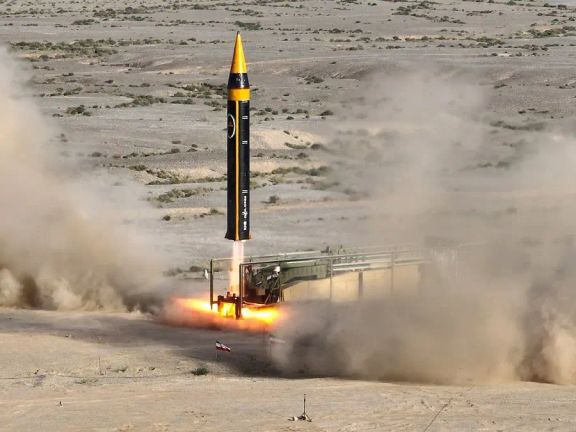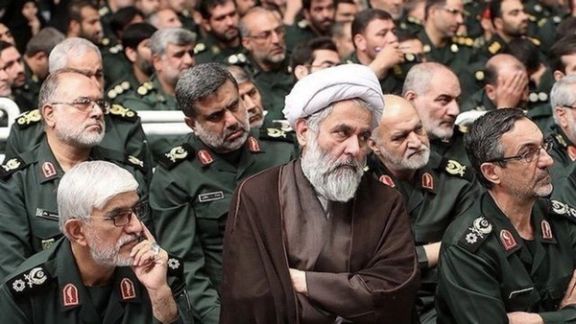Iranian Nurses Forced Into Overtime Work For 40 Cents Per Hour

Iranian nurses are forced into mandatory overtime for payments less that 40 cents per hour to make up for the shortage of healthcare practitioners.

Iranian nurses are forced into mandatory overtime for payments less that 40 cents per hour to make up for the shortage of healthcare practitioners.
The Iranian Labor News Agency (ILNA) on Friday cited a nurse as saying that due to lack of manpower, nurses are asked to work overtime, sometimes up to 150 or 170 hours per month in addition to their own minimum standard working hours required by law.
According to the country’s laws, a nurse has to work 150 hours per month to get paid a full salary, which is about 100 to 120 million rials, about $200 to $240, the nurse added.
Noting that overtime should not be mandatory, she said in many cases hospitals forced the overtime on the nurses who are getting paid a meager amount of 30 to 40 cents for every hour of extra work.
Nurses have held several rounds of nationwide demonstrations in the past few years to protest their low wages and the authorities’ inattention to their demands.
Driven by economic and professional problems, as well as lack of social and political freedoms, an increasing number of Iran's healthcare professionals emigrate.
Around 10,000 healthcare practitioners have left Iran over the past two years to work in the Arab world. With economic and financial conditions at rock bottom, MP Hossein Ali Shahriari, chairman of the Iranian parliament's Health and Treatment Committee, said most have gone to the Persian Gulf countries including Oman and the United Arab Emirates.

Iranian diplomatic and military officials sent contradictory messages on Friday regarding relations with Persian Gulf neighbors and regional peace and stability.
Foreign minister Hossein Amir-Abdollahian who just completed a tour of four Persian Gulf nations and returned to Tehran highlighted good relations and the importance of cooperation for the sake of “a better and more secure future.”
He visited Qatar, Oman, the United Arab Emirates and Kuwait days after Saudi Arabia’s foreign minister Prince Faisal bin Farhan went to Tehran after years of rivalry and animosity.
The foreign minister wrote on Instagram that “The Islamic Republic of Iran believes establishing mechanisms for dialogue and cooperation with all countries of the important Persian Gulf region is needed and could be beneficial more than ever before.”

At the same time Commander of the Islamic Revolution Guards Corps (IRGC) Navy Rear Admiral Ali-Reza Tangsiri said, “Any ship that wants to pass through the Strait of Hormuz must inform us of its nationality, type of cargo, and destination in Farsi, and if it does not do this, we will definitely go after it.”
This is hardly a sign of de-escalation that Western media and some officials have been referring to when describing the purpose of recent diplomatic contacts with Tehran.
In fact, Iran has seized and harassed several commercial vessels this year in the Persian Gulf and the greater region, for no clear reason, prompting the United States to increase readiness to provide maritime security.
US 5th Fleet and Combined Maritime Forces spokesperson Cmdr. Tim Hawkins told Breaking Defense earlier this month that in the past two years alone, Iran has attacked or seized 15 internationally flagged merchant vessels.
The United States announced in May that it will begin to bolster its defensive posture in the Middle East region.
“[The] United States will not allow foreign or regional powers to jeopardize freedom of navigation through the Middle East waterways, including the Strait of Hormuz,” National Security Council Coordinator for Strategic Communications John Kirby told reporters May 12, adding that there is “simply no justification” for Iranian forces to interfere, harass or attack merchant ships.
Since then, a flurry of reports have indicated that Washington has been in talks with Tehran over a possible informal arrangement to reduce tensions. The scheme, that the State Department has dismissed as erroneous reporting, would provide the Islamic Republic with financial incentives in return for a cap on the level of its uranium enrichment.
The official government news website, IRNA, publishing Tangsiri’s statement Friday added that “The Islamic Republic has also made it clear that it views US military presence in the region as a threat to its national security and a destabilizing factor in regional countries.”

A day earlier, the commander of the IRGC Aerospace Force Amirali Hajizadeh said that Iran plans to increase the range of its recently unveiled “hypersonic missile” to 2,000 kilometers from 1,400 km.
He added that the Islamic Republic of Iran has mastered all complicated technologies in the field of the defense industry, praising President Ebrahim Raisi’s government for full support, while criticizing his predecessor for restraining the missile program.

Sri Lanka is set to start bartering tea with Iran next month in lieu of $250 million owed for oil, a Sri Lankan official said on Friday.
In December 2021, the head of Iran’s Trade Promotion Organization, Alireza Peyman-Pak, signed an agreement with Sri Lankan Minister of Plantation, Ramesh Pathirana, according to which Colombo would barter tea in monthly instalments of $5 million to settle a $251 million debt to Iran because it cannot transfer money to Iran due to the US sanctions on Iranian banking.
"This is very timely for us because we get access to an important market and both Iran and Sri Lanka can trade without relying on dollars," Sri Lanka's Tea Board Chairman Niraj de Mel told Reuters.
"The agreement was to send $5 million worth of tea each month for 48 months but we plan to start with about $2 million per month."
According to the agreement, Sri Lanka’s Treasury will release equivalent of $5 million in rupees every month to the Sri Lanka Tea Board - a state-run industry regulator– that will then pay individual exporters in rupees at the central bank’s exchange rate.
“This scheme will not violate any UN or US sanctions since tea has been categorized as a food item on humanitarian grounds while none of the blacklisted Iranian banks will be involved in the equation,” read a statement by Sri Lanka’s plantation ministry.
Iran is among the top 10 importers of Ceylon Tea for the past several decades although purchases have declined following US sanctions.
Iran has been trying to increase barter deals amid sanctions. “We have the lower hand, and we have to make concessions, which means we have to accept any goods at any price”, Hamidreza Salehi, a member of Tehran’s Chamber of Commerce, has said.

The United States should aim at deterrence, rather than containment in any deal with Iran that allows it to keep uranium enriched to 60 percent, a former top official wrote in the Washington Post.
Dennis Ross, a former special assistant to President Barack Obama, and a diplomat with long experience in the Middle East argued in an op-ed published June 23 that if reports about a new limited deal with Iran are true, the Biden administration might be changing its approach.
The deal reportedly hinges on the premise that Iran keeps its highly enriched uranium, practically making it a nuclear threshold state that could quickly decide to produce a weapon.
“Instead of seeking to prevent Iran from going nuclear as it has up until now, the United States would be tacitly shifting to a policy of accepting Iran’s nuclear status and relying on deterrence. It would be shifting from a policy of prevention to a policy of containment,” Ross argued.
He further reasoned that “Such a posture would all but guarantee nuclear proliferation across the Middle East,” where Saudi Arabia, Turkey and Egypt may decide to obtain nuclear weapons.
“The Biden administration must therefore structure any forthcoming deal with prevention — not containment — as its goal,” Ross said advocating that first, a deal limited to the end of Biden’s first term. Second, the US should make it clear that if Iran moves toward producing a weapon it will destroy all its nuclear infrastructure.
Third, the US “should conduct exercises in the region rehearsing attacks against hardened targets to underline its seriousness,” Ross underlines.

Iran's chief justice claimed he is battling corruption in government bodies without mentioning cases in entities under Supreme Leader Ali Khamenei’s control.
In a televised interview aired by the state broadcaster IRIB Wednesday evening, Gholamreza Mohseni-Ejei said he and the organizations under his supervision would never shut their eyes to corruption and infringements of the law, and in some cases their actions have upset the government of President Ebrahim Raisi and caused complaints.
No mention was made, by Ejei or the interviewer of corruption cases including a new scandal that involves the family of the head of the State Endowment Organization Mehdi Khamoushi, a Khamenei appointee.
Critics often allege that IRIB interviews with top state officials are scripted, and interviewers always refrain from challenging the interviewees.

Hardliner whistle-blower Vahid Ashtari revealed in a series of tweets on June 18 that a 150-hectare piece of land endowed by a local family in Qazvin including a farm with 1,000 cattle has been rented out to Mona Chaychian, Khamoushi’s daughter-in-law, at a monthly rent of 10m rials (around $20 at current exchange rates).
Ashtari who dubbed the case as “Daughter-in-Law Favoritism in Endowment Organization” pointed out in his tweets that young couples are unable to rent a basement in the outskirts of the city of Qazvin with the same amount of money as a point of comparison.
“The Endowments [Organization has officially turned into the back yard of corruption [-mongers],” he wrote.
The Organization has confirmed the deal but claimed that Khamoushi was not involved in it and threatened to sue the whistle-blower.
Ashtari is a member of Edalat Khahan (Justice Seekers), a political group of mainly university students who are loyal to Iran's Supreme Leader Ali Khamenei and are also close to former nuclear negotiator Saeed Jalili who ran against Raisi.
Gholam-Ali Jafarzadeh, an outspoken former lawmaker, said Wednesday he was barred from running in the previous parliamentary elections because he had been investigating allegations of corruption in the Endowment Organization.
But no one is sure if there is a political agenda behind the revelations by the hardliner group.
In April 2022, Ashtari’s revelations sparked the Layette-gate scandal that led to calls for the resignation of Speaker Mohammad-Bagher Ghalibaf and resurfacing of other alleged corruption cases against his family.
Ashtari revealed that Ghalibaf’s wife, daughter and son-in-law had returned from Turkey with massive extra luggage including a baby bed and stroller that formed part of the layette for his yet unborn grandchild.
Critics accused Ghalibaf of hypocrisy for admonishing others for luxury and telling Iranians they should support domestically made products, and telling those who are suffering economic hardships to be patient, when his own family travels abroad to buy luxury products.
Some hardliners claimed that Jalili and the ultra-hardliner Paydari Front were behind the scandal. They also said these political rivals wanted to oust the speaker and takeover the Parliament's presidium.
Ashtari has been sentenced to two years in prison and deprivation from media and social media activity for his role in “Layette Gate” but has apparently appealed the sentence.

The former intelligence chief of Iran’s Revolutionary Guards says the US has sent messages to the regime to say it is not seeking a regime change in Iran.
Hossein Taeb said Thursday that the US sent the message through three neighboring countries of Iraq, Qatar and Oman, saying that it is not looking to overthrow the regime "so let's negotiate and reach an understanding.”
Taeb, who now serves as an advisor to the Guards commander-in-chief, claimed that Washington’s volte-face is the result of the “stability” of the Islamic Republic.
“In the hybrid warfare the enemies launched against our country last year, they intended to put Iran at the crossroads of continuing its revolutionary path or facing international isolation," he said, boasting that they failed.
“Friends and foes have understood that they need to interact with the Islamic Republic,” he added.
In the Islamic Republic jargon, ‘enemies’ usually means the United States and Israel, and recently every entity and individual who has expressed support for antiregime protests ignited by the death in custody of 22-year-old Mahsa Amini in September 2022.
It has been the boldest uprising against the Islamic Republic since establishment in 1979 when the regime adopted a staunch anti-West and anti Israel foreign policy, and domination of the region.
Taeb added that the US presence in the Middle East is weakening partly due to the war in Ukraine and many countries are choosing a more independent path.
He claimed that, nevertheless, the enemies attempt to create “an all-encompassing riot before the upcoming elections aimed at boycotting and postponing the elections under various pretexts.” He was referring to Iran's parliamentary elections in March 2024.